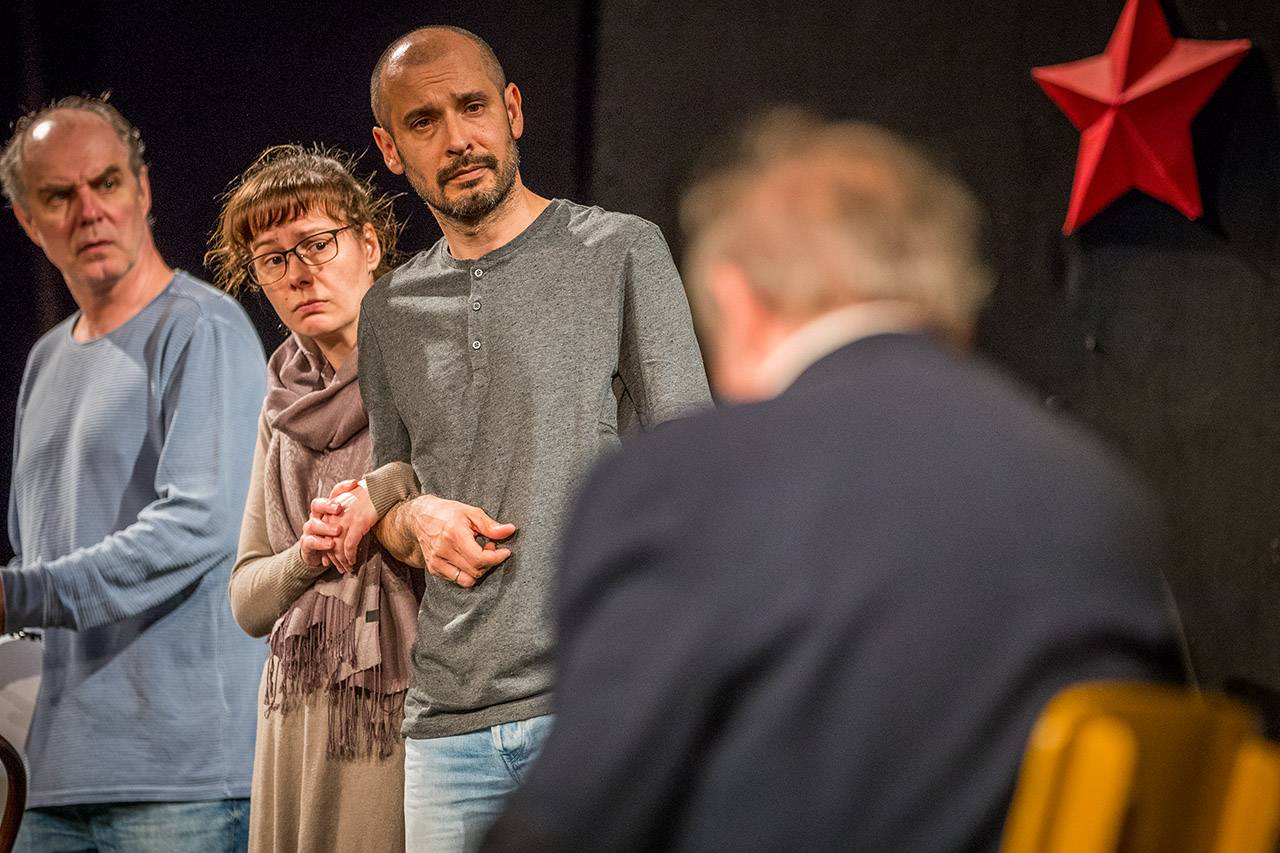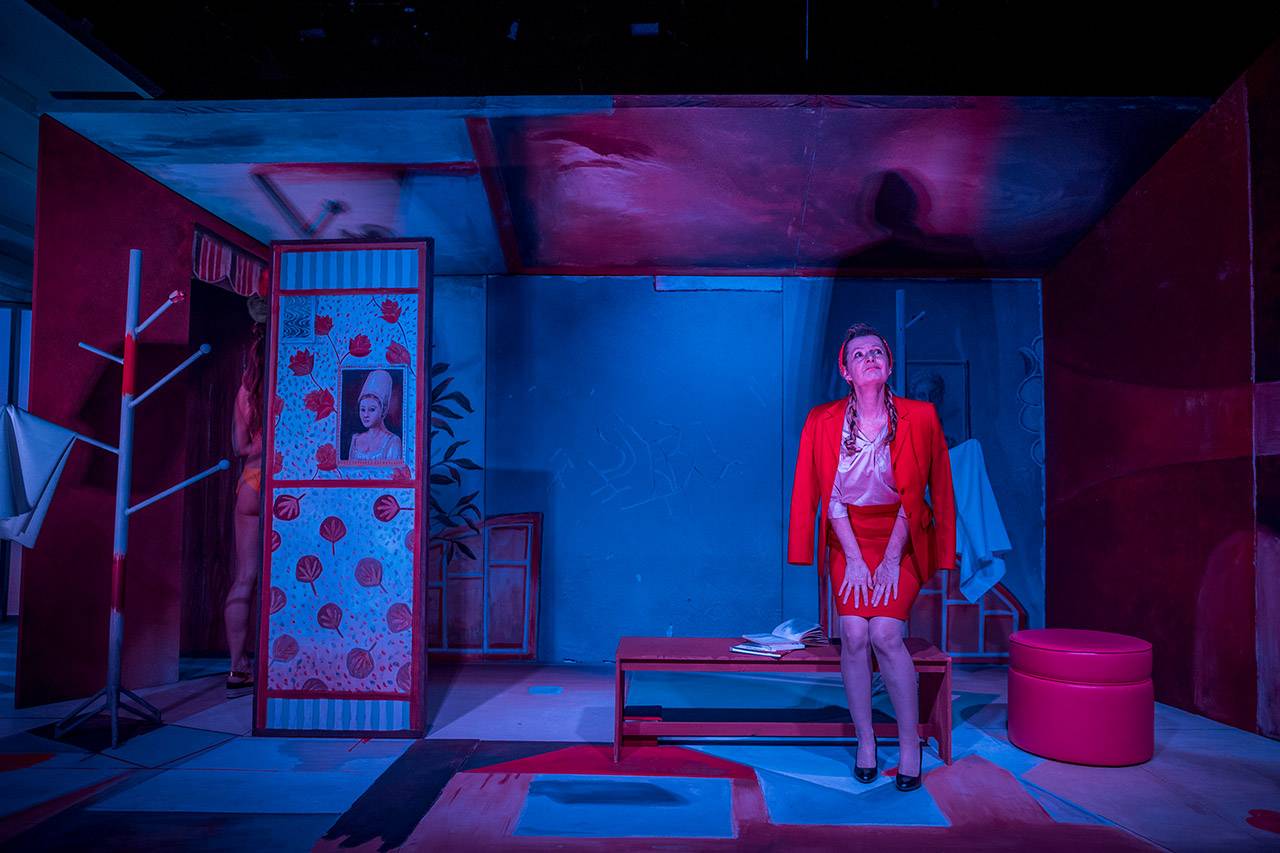Blog of Stephen Bailey
Stephen Bailey is taking part in the rehearsals of a drama called „The Salem Witches” as a second assistant. He is writing a blog about the period that he spend in Szombathely.
Blog of Stephen Bailey 1:
In February, I was selected to be a scholar for the European Theatre Convention. For the last fortnight I have been fortunate enough to be hosted as an assistant director by Weöres Sándor Színház as part of this. I applied for the opportunity because I believe theatre has a universal language but I was also keen to see how a different culture of theatre would look at plays differently to England.
When The Crucible is performed in a major theatre in the UK it will rarely be presented without being set in this 17th century small American town. We rarely challenge, modify or evolve the original idea of the playwright to think about what it might mean now. When Arthur Miller wrote the play in 1953 he was directly addressing 'McCarthyism'. This was a political culture in American which accused non-conservative politicians and artists of being secret communist agents. Miller specifically set out his problems with this movement by using the analogy of the Salem Witch trials – a seventeenth century event in a small American town where multiple women were persecuted and executed after being falsely accused of witchcraft. However, neither the trials nor McCarthyism are not of British history, McCarthyism did not happen in England. Productions often feel separate to our lives.
However, in Hungary, The director, Róbert Alföldi, approaches the script differently to a British director. We focus on history and tradition, he focuses on bringing the play to his audience. He has deliberately set it in small town Hungary in the recent past if not the present. The world of the play reflects that of Hungary. American references are reduced or adapted to work for a 2018 audience.
This is brilliant because The Crucible or (A salemi boszorkányok as it is titled here) is about suspicion, conformity and persecution: universal human experiences that occur today in Hungary, in America in 1953 and in Salem in 1692.
A play is not just about the past but about the present, and that should be shown on stage. We are telling a story that is immediate and relevant not one that fixates on an older production. Do I know enough about Hungarian culture to understand every nuance? No. But I can feel the power the comes into the performances when the actors play human, real truth rather than pretending to be seventeenth century American colonists.
Translation helps of course. A British theatre would hesitate to change the script. They might not be allowed to. As I work through the Hungarian translation I see that Róbert has cut many references that are specific to Salem and changed the language to be modern, direct and raw. The story and message of the play are still being served; it is still The Crucible. But it is more urgent and pertinent. Robert has said he cannot change too much. Miller is a great writer whose plot is too tight and complex to change much, but the text is adapted to the production's needs. It's the same play, line by line, but the focus and language has been deliberately updated – and why shouldn't it be? Perhaps this is something we should consider doing more in Britain?
Also, looking at the play with new eyes also allowed me see the range of emotion it contains. There are parts that are darkly funny and satirical. Comedy in The Crucible is not something one would expect to find in a British production It is seen as a serious tragedy. However, how close are ecstasy and grief? Crying and laughing? They are two sides of the came coin; when we sob and laugh our breath speeds up and our chest tightens in the same way. They are both emotional extremes and closely intertwined.
I saw this also in the production of The Importance of Being Earnest (Ernst (komoly) az élet (Bunbury) )that is currently playing in the Emília Márkus Studio. An even more famous British play, we always perform it as a great comedy. Its purpose is to make the audience laugh. Sándor Zsótér 's production still had its moments of comedy, but it was the first production (and I have seen at least ten others) that considered the darker side of Oscar Wilde's piece. Jack Worthing is an orphan. He does not know his identity. He has no name and no past – it is a tragic situation. At the end of the play he discovers who he is and gains a family. I realised this for the first time when I saw it in Szombathely. There have been so many hilarious productions in England that we no longer think deeply about the social commentary of the piece. It is about truth and identity as much as it is about comedy.
What I am learning from my experience is the need to re-examine how one considers the world and to look past expectations. Theatre has a wonderful ability to challenge and surprise its audience. When we make theatre, in the UK, Hungary or elsewhere we should keep that in mind – it is what.
Blog of Stephen Bailey 2:
What is a director? Does the term have any meaning? Both were questions asked on a course at the Young Vic Theatre (London) I recently attended. There is value to them. Theatre is thousands of years old but directors have only existed for a little over a century. How directors should work with actors is a contentious subject. Many successful directors offer completely different ideas and thus it has been interesting to observe where Róbert Alföldi's practice overlaps with what I have seen in Britain and where it diverges.
At the heart of Róbert 's work are shared ideas: the motivation and intention of characters; the given circumstances of a scene; relationships between characters. At their heart, these come from Stanislavski's work. Róbert has occasionally mentioned him and modern British theatre is based on the techniques and theories of Stanislavski. I would not describe Róbert as a devotee of Stanislavski but it is unsurprising that these ideas are common across European theatre.
However, how he implements these ideas diverges from British theatre In Britain we generally spend days, if not weeks, sitting around a table. We discuss the scenes, motivations and relationships. We break down each scene into parts or units or beats, to try and understand the scene. This work is not present in the rehearsal process of A salemi boszorkányok. After the initial reading we moved straight into staging the piece. The work is done onstage, as the piece is rehearsed. Similar terminology is used but it is done in a physical, not a mental space.
Additionally, what was unusual for me has been the degree of precision and specificity Róbert immediately demanded from actors: where they stood, how they talked, what was to be stressed in lines. This behaviour would be unexpected in Britain. We emphasise collaboration and letting actors 'find' the scene through practice. For a director to 'direct' so precisely would be seen as invasive. However, it is clear watching him work that he gets results and pushes actors to an open and honest state.. A conversation I had with Eszter Bánfalvi helps to explain this. When Róbert gets on stage and gives a demonstration of what he wants Eszter says she does not attempt to copy him. Instead she attempts to read his inner action and energy and consider how she can interpret and implement that with her body and voice. We return to a Stanislavskian principle, arguably with additional detail from the work of Michael Chekhov. The inner energy and awareness of character are best found through physical work and inhabiting a space. It seemed strange to me because it was unusual but it is focusing on a achieving and similar result to British work – to understand the play and play truth.
I should note that Róbert is also an acclaimed actor. To practise both roles is unusual in British theatre – a director rarely acts . Using his talent in rehearsal is sensible. Also, the actors are used to this practice. They have been trained like this and work like this regularly. I don't know enough about Hungarian theatre to say Róbert is typical, but he has a common language with his actors. If Róbert was to direct like this in Britain I think he would face resistance. Likewise, I imagine many British directors would frustrate Hungarian actors by avoiding such strong offers. What I'm trying to understand as I watch him work is how and what I can adapt and use in my own practice.
On that note, what are the benefits of this method? Performances are very open, very honest and very expressionistic. British theatre tends to be intellectual. We often shy away from complete openness because it makes us feel vulnerable. The technical approach I mentioned would be used in Britain, and we would also use exercises designed to unlock emotion and develop comfort on stage. A good British production achieves this, less good productions often seem masked or lacking in life.
The problem of body language is often discussed in British theatre and Róbert's directing seems to overcome this. However, I can see limitations in Róbert's method. The production relies on the director making the correct choices. It is his vision on stage, what if it did not work? From conversations with cast members I gather they might then look at discussing moments more and clarifying imprecise direction. Similarly, it requires very receptive and calm actors to cope with the precision of his demands. The ensemble and Róbert's talents are evident because I do not see this in the rehearsal room and because I can see what they achieve every time we work on a scene.



